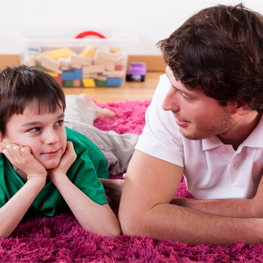
Talking to children about scary events can be uncomfortable. There are many ways of handling such conversations that are driven by personal values, parenting style, and your unique relationship with your child.
Here are a few strategies for having difficult conversations with your kids about upsetting events:
Answer your children’s questions as honestly as possible. Children who have learned about a specific event will naturally be curious about it and have lots of questions. Do your best to answer their questions as honestly as you can but without going into too much detail.
Listen to your children. Sometimes children try to make sense of the world by talking, and listening to them, even if the conversation is uncomfortable, lets them know you care about their feelings and reactions.
Provide an outlet for your children. Sometimes children cannot clearly articulate their feelings and thoughts. Art, playing with toys, and writing stories can help children process complicated emotions. Therapy is also an option if your child becomes overly anxious.
Sometimes helping victims or expressing opinions on a larger scale can help children feel less powerless. Consider participating in a fundraiser or helping your child write a letter to first responders.
Assuage your children’s worries, especially if they are concerned about their own safety. Acts of terrorism, mass shootings, and natural disasters are horrible, but most people are not in direct danger. In 2010, for example, my then-five-year-old son was very worried about a volcano destroying our home after he heard about the Eyjafjallajökull eruption in Iceland. We lived in Maryland at the time, so there was no threat of volcanic activity in our area.
Other times, children might fear that someone whom they know has been harmed or is in harm’s way. Letting your children know their friends and family are safe can be a source of great comfort.
Don’t make promises you can’t keep or overstate your power in the world and your child’s life. You cannot keep your child completely safe, and you cannot make the world a safe place. You also can’t guarantee events such as these won’t happen again in their lifetime.
Incorporate your family’s value system and beliefs into discussions about scary events. Your family’s worldview can help your children make sense of confusing and upsetting events.
Teach your child ways in which to manage strong emotions. Naming difficult emotions, learning how to talk about them, and finding ways to calm down are all important life skills.
Monitor your child’s access to media coverage of these events. These days, it is very easy to find graphic pictures and accounts of terrorist attacks and disasters. Such images could be upsetting to your child, particularly if they encounter them alone.
Coordinate with your child’s school and other potential sources of information such as your partner or spouse, ex-spouse, or other caregivers. Make sure you are on the same page about how to approach these topics. If you aren’t, do not put your child in the middle. Continue to be a source of information, comfort, and answers.
We live in a sometimes scary world, and sometimes it is impossible to avoid talking about uncomfortable topics. Opening up the lines of communication with your child can put their mind at ease and encourage them to come to you when they need comfort or information. You are your child’s safe place, even if the world sometimes isn’t.
Danielle Bostick, a former Solo Mom and ESME’s Well-Being/Health & Fitness Guide, esme.com, is a psychotherapist by trade and a mom to six kids. When not working as a counselor, she is writing about Pittsburgh Steelers football for SB Nation, sexual assault and child sexual abuse for the Huffington Post, and other topics for The Good Men Project. You can find her on Twitter @danibostick, Facebook, and website, danibostick.com.
Calgary’s Child Magazine © 2024 Calgary’s Child